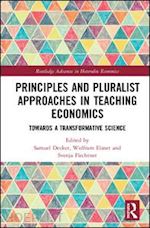Towards a pluralist economic education for a transformative science – Introduction, Samuel Decker, Wolfram Elsner and Svenja Flechtner Part 1: Principles of Teaching Pluralist Economics 1. The Second Opinion: An Ethical Approach to Learning and Teaching Economics, Alan Freeman 2. Making the incommensurable comparable: A comparative approach to pluralist economics education, Andreas Dimmelmeier, Frederick Heussner, Andrea Pürckhauer and Janina Urban 3. What can teaching critical pluralist economics gain from "de-othering" sociology?, Stephan Panther 4. Comparing paradigms on a level playing field, Karl Betz with Martin Ehret 5. It Needs Two Eyes to See in Perspective: Teaching Economics through the Confrontation of Dissenting Views, Michael Derrer 6. Economic competence, economic understanding, and reflexive judgment: A social theory of teaching teachers of economics, Alexander Lenger, Yvette Keipke and Nils Goldschmidt Part 2: Approaches and Building Blocks 7. Introduction to Critical Political Economy in a multi-paradigmatic setting, Johannes Jäger 8. Heterodox perspectives in teaching the European integration and crisis: Critical political economy and post-Keynesianism, Johannes Jäger and Elisabeth Springler 9. Ecological economics in research and teaching: A matter of theoretical and ideological perspective, Peter Söderbaum 10. Suggestions for incorporating sustainability into the macroeconomics course, Jack Reardon and Maria Alejandra Madi 11. Demand-driven ecological collapse. A stock-flow fund-service model of money, energy and ecological scale, Jonathan Barth and Oliver Richters 12. Teaching feminist economics through student-written diaries, Genna R. Miller 13. Undermining the microeconomic textbook approach: Steps towards competitive pluralism, Frank Beckenbach 14. Functional income distribution in economic paradigms: The failure of the neoclassical approach and alternatives, Hans-Jörg Herr 15. The balance-sheet approach to macroeconomics, Dirk Ehnts 16. How to teach Ethics & Economics to undergraduate students?, Stefan Kesting 17. Addressing controversies in economics instruction through interdisciplinary learning communities: The Evergreen experience, Peter Dorman Part 3: Teaching for Socio-Ecological Transformation: Economics as a Transformative Science? 18. Contours of a critical transformative science, Samuel Decker 19. Transformative Economics – Calling for a more conscious relationship between economics and society, Jonathan Barth and Florian Rommel 20. Tackling the roots: (Economic) Education for social-ecological transformation and degrowth societies, Christoph Sanders 21. Pluralist economics is taking shape. But further steps have to follow – Conclusion, Samuel Decker, Wolfram Elsner and Svenja Flechtner Appendix: Documentation: practicing pluralism through study program accreditation Index











